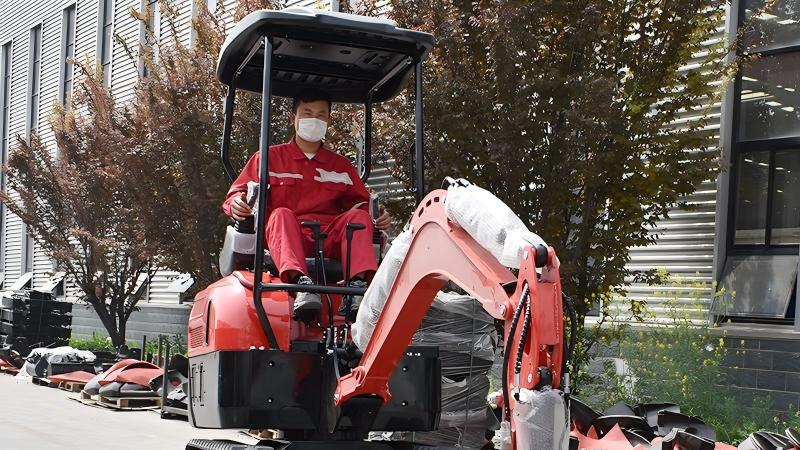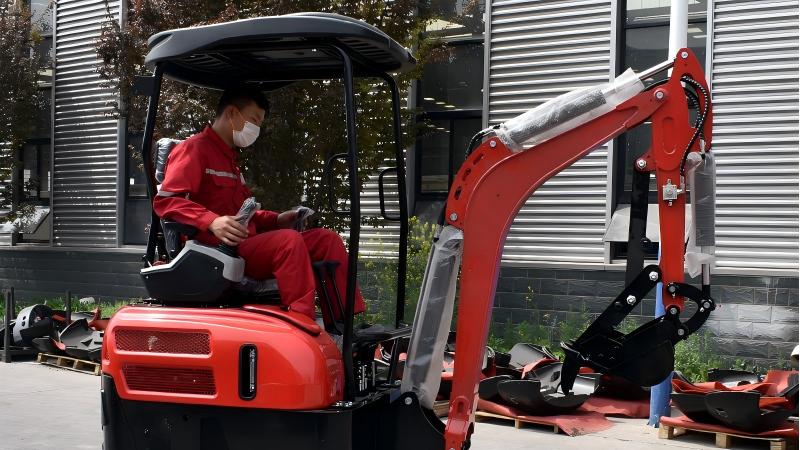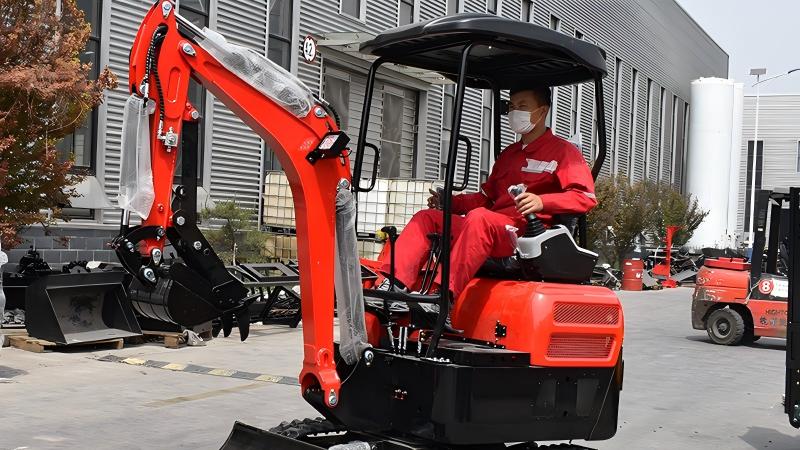Finding the right mini excavator for your project, whether it's for landscaping, trenching for utilities, or site clearing, often starts with the question: "Where can I rent a mini excavator near me?" In today's information-rich world, this might seem like a simple task, but to ensure project efficiency, safety, and cost-effectiveness, it's crucial to know where to look and what to look for.
This article aims to guide you through the landscape of mini excavator rentals, offering practical advice on how to find suppliers, evaluate their offerings, and select the most suitable machine for your specific requirements.
Who Offers Mini Excavators for Rent?
Before you begin your search, it's helpful to understand the types of companies that typically rent out construction equipment, including mini excavators.
National and Large Regional Equipment Rental Companies:
Examples: United Rentals, Sunbelt Rentals, Herc Rentals (in North America), Boels Rental, Loxam (in Europe), and similar large players in other regions.
Advantages: Extensive fleet of modern machinery, numerous branches, professional support, often offer delivery/pickup services, and usually provide insurance options and training resources.
Disadvantages: Prices can be higher than smaller companies; sometimes less flexible with short-term rentals or niche requests.
Local and Independent Equipment Rental Companies:
Advantages: Often more flexible with pricing and terms, can offer a personalized approach, potentially lower rates, and possess good knowledge of local conditions and specific needs.
Disadvantages: Smaller fleet size, possibly older equipment, limited delivery capabilities, and fewer branches.
Construction Equipment Dealers:
Examples: Many official dealers for brands like Caterpillar, John Deere, Kubota, Bobcat, Yanmar, and others offer both sales and rentals of their equipment.
Advantages: Latest models, high-quality service and support, in-depth knowledge of their specific brand.
Disadvantages: Can be among the most expensive options, limited choice of brands.
Landscaping or Construction Companies (Occasionally):
Some larger landscaping or construction firms that own their equipment might rent it out during periods of downtime. This is less common and usually not widely advertised.
How to Find Rental Suppliers "Near Me"
In 2025, there are several effective ways to locate suitable rental options:
Online Search (Google Maps, Search Engines):
Most Effective Method: Open Google Maps or your preferred search engine (e.g., Google, Bing).
Enter Queries: Use precise and general phrases:
"mini excavator rental near me"
"mini digger hire [your city/area]"
"equipment rental [your city]"
"excavator hire [your postal code]"
Review Results: Search engines often display maps with company locations, contact details, reviews, and links to their websites.
Specialized Online Rental Platforms/Aggregators:
There are platforms that aggregate rental offerings from various companies. Examples might include (depending on your region) Dozr, EquipmentShare, BigRentz, etc. These platforms allow you to compare prices and availability from multiple suppliers in one place.
Yellow Pages / Business Directories:
While more traditional, this method can still be useful for finding local companies that might not have a strong online presence.
Word-of-Mouth and Recommendations:
Ask friends, industry colleagues, or other contractors who they've rented equipment from. Personal recommendations are often among the most reliable.
What to Look for When Choosing a Mini Excavator?
Once you've identified a few potential suppliers, the next step is to determine which mini excavator best suits your project.
Excavator Size and Weight:
Operating Weight: Ranges from 1 to 8+ tons. Smaller models (1-3 tons) are ideal for tight spaces, indoor work, or delicate surfaces. Mid-sized (3-5 tons) are versatile for most landscaping and general construction tasks. Larger mini excavators (5+ tons) offer more power and digging depth, approaching the capabilities of full-sized machines while remaining more compact.
Dimensions: Consider the width of gates, doorways, or other access points. Some models feature a variable undercarriage, allowing the track width to be adjusted, which is very convenient.
Digging Depth and Dump Height:
Determine the maximum depth you need to dig (e.g., for a foundation, trench). Ensure the chosen model can achieve this depth. Dump height is also important if you need to load material into tall trucks or containers.
Power and Hydraulic Flow:
Crucial if you plan to use hydraulic attachments such as a hydraulic hammer, auger, or grapple. Confirm the required hydraulic flow (GPM or liters/min) for your attachment and ensure the excavator meets these specifications.
Track Type:
Rubber Tracks: Ideal for working on asphalt, concrete, or lawns, as they cause less surface damage.
Steel Tracks: Preferred for heavy-duty conditions, rocky terrain, or demolition, offering better traction and durability.
Attachments:
Do you just need a bucket? Or do you also require a hydraulic hammer, auger, grading bucket, ripper, or a quick hitch? Inquire about the availability and rental cost of necessary attachments.
Operating Conditions:
Will you be working in confined spaces? Do you need a zero tail swing excavator to work flush against walls?
What type of soil will you be working with? Clay, sandy, rocky? This might influence the required power and bucket type.
Key Questions to Ask the Rental Company:
Once you've identified your desired specifications, contact a few companies and ask the following questions:
Availability and Booking: Is the desired model available on your required dates? How far in advance do you need to book?
Rental Costs:
Daily, Weekly, Monthly Rates? Inquire about rates for different rental durations. Longer rentals often result in a lower daily cost.
Are Engine Hours Included? Some companies set hour limits per day/week (e.g., 8 hours per day) and charge extra for exceeding them.
Discounts: Are there any discounts for new customers, long-term rentals, or multiple units of equipment?
Insurance:
Is insurance required? Do they offer their own insurance (e.g., Loss Damage Waiver - LDW), and what is its cost and coverage?
Can you use your own insurance (e.g., contractor's liability insurance)?
Delivery and Pickup:
Do they offer delivery and pickup services? What is the cost of delivery to your job site and return? This can significantly add to the total cost.
Can you pick up the excavator yourself? If so, what type of trailer and towing vehicle would be required (weight capacity, braking system, etc.)?
Operator Requirements:
Are there any special licenses or certifications required to operate a mini excavator in your region? (Some jurisdictions require certification for certain types of machinery).
Do they provide a brief operational walkthrough or safety briefing?
Fueling and Maintenance:
How is the machine supplied (full tank, empty)? How should it be returned (refueled)?
Who is responsible for refueling during the rental period?
Who is responsible for daily maintenance checks (fluid levels, lubrication)?
What is the procedure in case of a breakdown? What's their service call process?
Payment Terms:

Is a deposit required? When is payment due?
What forms of payment are accepted?
Final Tips
Start Your Search Early: Especially during peak seasons (spring/summer), popular models can be booked quickly.
Get Multiple Quotes: Compare prices and terms from 2-3 different companies to find the best value.
Read the Contract Carefully: Before signing, ensure you understand all rental terms, including responsibility for damages, late return penalties, etc.
Inspect the Machine Before Renting: Before taking possession of the excavator, thoroughly inspect it for existing damage and document it (photos/videos) to avoid disputes upon return.
By following these guidelines, you can effectively find and rent a mini excavator that best suits your project's needs, ensuring both safety and cost-efficiency.
Post time:Sep-25-2020


